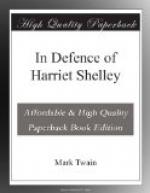No, he could not go into those details, and we excuse him; but, nevertheless, we do not rest content with this bland proposition to puff away that whole long disreputable episode with a single mean, meaningless remark of Shelley’s.
We do admit that “it is certain that some cause or causes of deep division were in operation.” We would admit it just the same if the grammar of the statement were as straight as a string, for we drift into pretty indifferent grammar ourselves when we are absorbed in historical work; but we have to decline to admit that we cannot guess those cause or causes.
But guessing is not really necessary. There is evidence attainable— evidence from the batch discredited by the biographer and set out at the back door in his appendix-basket; and yet a court of law would think twice before throwing it out, whereas it would be a hardy person who would venture to offer in such a place a good part of the material which is placed before the readers of this book as “evidence,” and so treated by this daring biographer. Among some letters (in the appendix-basket) from Mrs. Godwin, detailing the Godwinian share in the Shelleyan events of 1814, she tells how Harriet Shelley came to her and her husband, agitated and weeping, to implore them to forbid Shelley the house, and prevent his seeing Mary Godwin.
“She
related that last November he had fallen in love with
Mrs.
Turner
and paid her such marked attentions Mr. Turner, the
husband,
had carried off his wife to Devonshire.”
The biographer finds a technical fault in this; “the Shelleys were in Edinburgh in November.” What of that? The woman is recalling a conversation which is more than two months old; besides, she was probably more intent upon the central and important fact of it than upon its unimportant date. Harriet’s quoted statement has some sense in it; for that reason, if for no other, it ought to have been put in the body of the book. Still, that would not have answered; even the biographer’s enemy could not be cruel enough to ask him to let this real grievance, this compact and substantial and picturesque figure, this rawhead-and-bloody-bones, come striding in there among those pale shams, those rickety spectres labeled wet-nurse, bonnet-shop, and so on—no, the father of all malice could not ask the biographer to expose his pathetic goblins to a competition like that.
The fabulist finds fault with the statement because it has a technical error in it; and he does this at the moment that he is furnishing us an error himself, and of a graver sort. He says:
“If
Turner carried off his wife to Devonshire he brought
her
back
and Shelley was staying with her and her mother on
terms
of
cordial intimacy in March, 1814.”
We accept the “cordial intimacy”—it was the very thing Harriet was complaining of—but there is nothing to show that it was Turner who brought his wife back. The statement is thrown in as if it were not only true, but was proof that Turner was not uneasy. Turner’s movements are proof of nothing. Nothing but a statement from Turner’s mouth would have any value here, and he made none.




